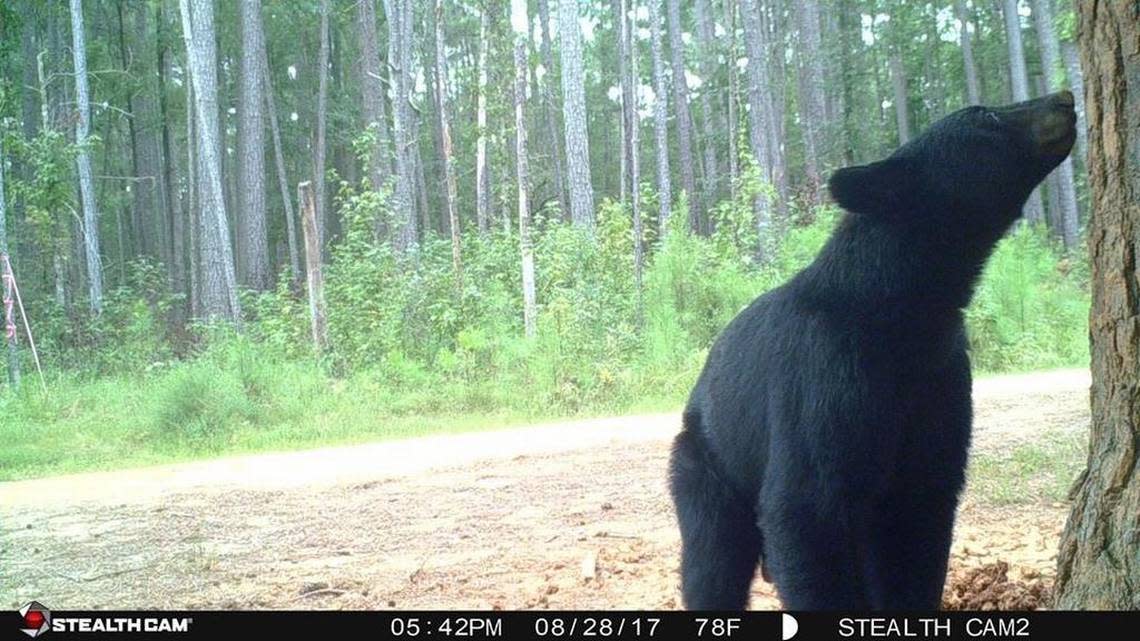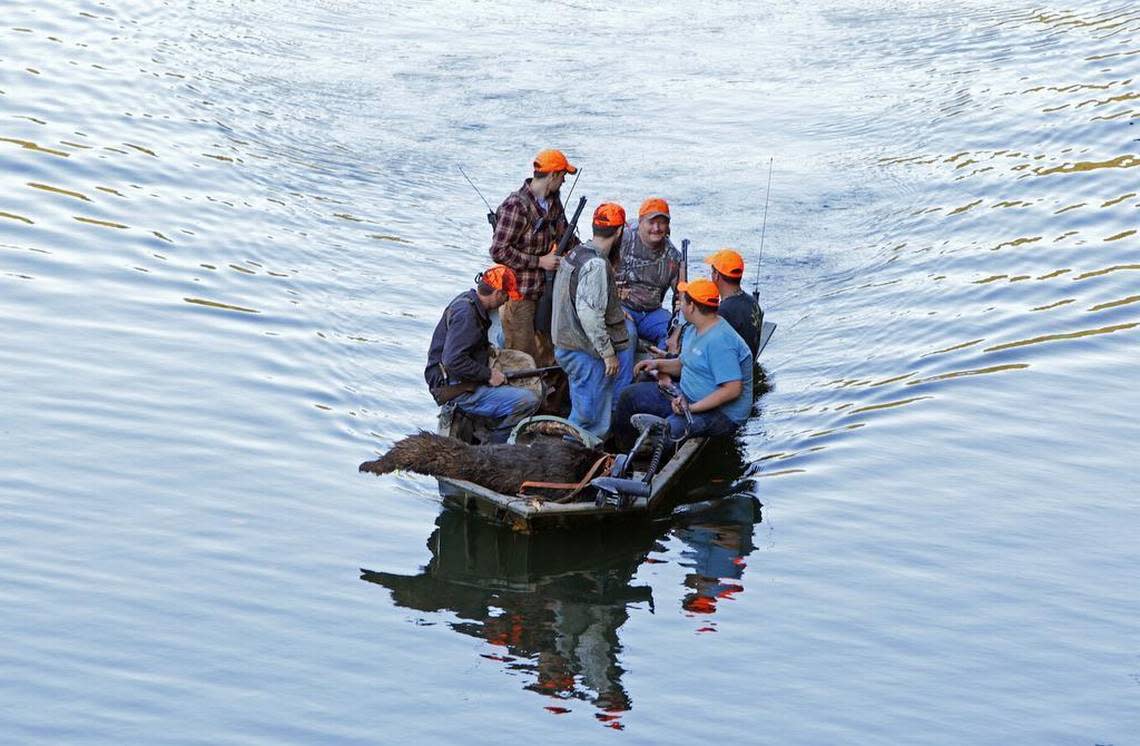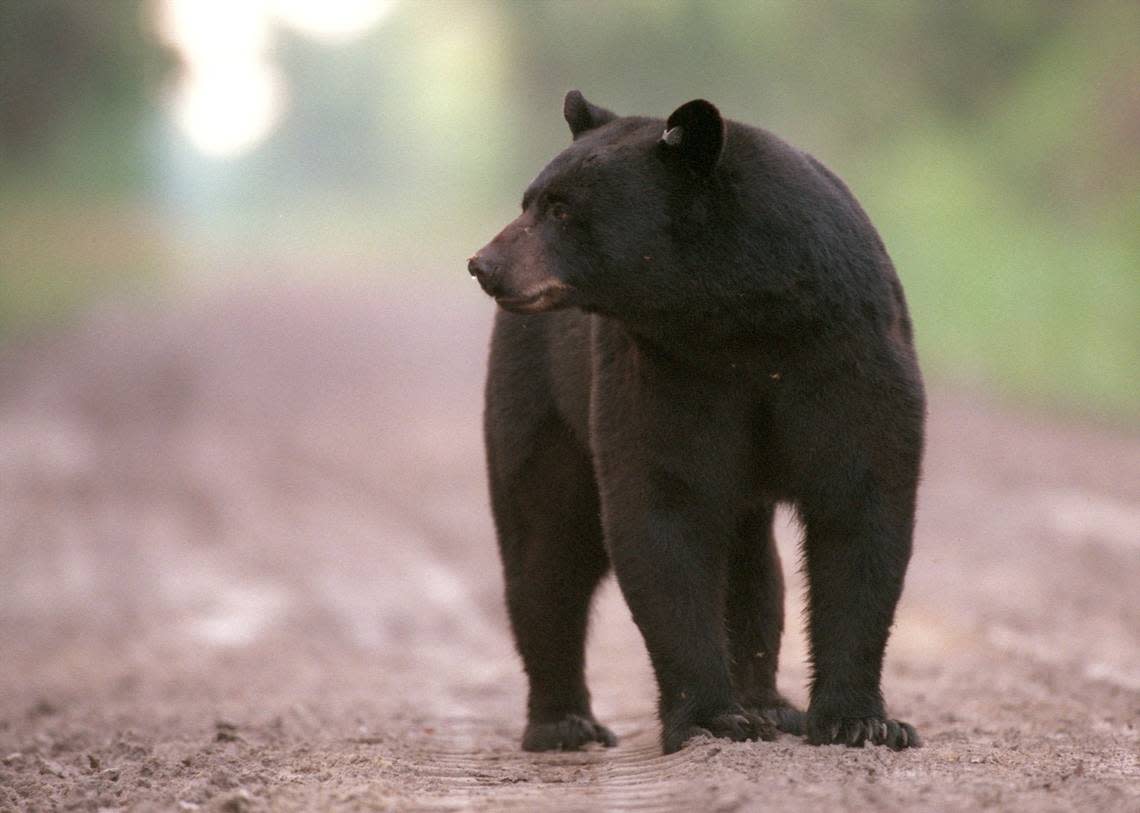After hunters used bait, bear killings surged near Myrtle Beach
Every fall for the past three years, the state has given hunters permission to put food in the woods of coastal South Carolina to attract bears.
Then, when bears sauntered up to eat the food, some of those sportsmen shot the bruins.
The practice is called baiting and it’s part of a population control strategy that has led to a sharp increase in the number of bears killed near high-growth Myrtle Beach.
Hunters have killed 105 black bears since 2021 during the two-week hunting season on the northern coast, compared to fewer than 50 in the entire decade before baiting was allowed, according to data from the S.C. Department of Natural Resources.
Baiting for bears is “directly related’’ to the substantial rise in harvests, said Charles Ruth, the DNR’s big game coordinator.
“We’ve got 10 plus years before this where there were very few bears harvested,’’ he said, noting that “as soon as the law was changed,’’ the harvest shot up.
Sportsmen have averaged more than 30 kills annually the past three years, up from fewer than five per year before that, statistics show. The largest bear killed in this past fall’s bear hunt was a 425-pounder in Horry County.
Not everyone likes the idea of dangling food in front of bears to make them easier to kill, saying it is cruel and gives the hunter too much of an advantage over unsuspecting animals.
But supporters of the practice say baiting is an effective way to manage a growing bear population.
The idea is to keep the bear population from becoming too large near tourist-clogged Myrtle Beach, while giving sportsmen a chance to hunt South Carolina’s largest land animal.
“The last place you want to see a bear is on a golf course in Myrtle Beach,’’ said Rep. Davey Hiott, a Pickens County Republican who formerly chaired the House agriculture committee, which signed off on the baiting rules that were later approved by the Legislature.
Hiott, who has dealt with bear-hunting issues for years at the State House, said legislators from Myrtle Beach approached him after hearing from business people worried about bears that sometimes scurry through the area.
“The whole point in starting the program is they were starting to be more prevalent,’’ Hiott said of the coastal region’s bears. “The local folks were like ‘Wait a minute, this is not good for business.’’
People have for decades encountered bears in the Myrtle Beach area, a place that despite the glitz and heavy development has historically maintained pockets of woodlands and wetlands that make good bear habitat.
It’s not unusual to hear about cars hitting black bears on major highways to Myrtle Beach. Last year, an 84-year-old woman reported a bear on her property near the 18th green of a golf course in Little River, north of Myrtle Beach, according to The Sun News.
Outside South Carolina’s mountains, the Myrtle Beach area has what is believed to be the state’s largest population of black bears, with an estimated 300-400 animals. It’s an extension of the bears’ range in coastal North Carolina.
All told, South Carolina may have as many as 1,600 bears, most of them in the state’s three mountain counties, the DNR says. But the populations are estimates and officials concede it is hard to quantify how baiting might keep populations in check. The DNR is now working to update population data.

Easy kills
While Hiott and state wildlife department officials say the increased harvest near Myrtle Beach was necessary, the idea of putting out bait to kill bears can be controversial.
The Humane Society of the United States has called the use of bait, particularly man-made food products such as chocolate, “unsporting and unethical.’’
“It’s kind of like a guaranteed kill,’’ said California resident Henry Brzezinski, a former director of the Humane Society in the Columbia area.
When the Legislature was considering allowing bear baiting in 2021, the DNR also raised concerns about allowing the practice because of those kinds of questions. Few southern states allow bear baiting.
Ultimately, the S.C. Legislature approved baiting but the new law limits the type of food to be used as bait. Food must be natural, such as fruits and nuts, as opposed to processed human food.
Becci Robbins, a founder of the Columbia non-profit group the Progressive Network, said the use of bait is a particularly bothersome part of a sport that isn’t needed. Critics characterize the bear harvest as little more than a trophy hunt. Robbins said bear encounters with people may be occurring because the human population is expanding.
“We are encroaching on their space, and now we are apparently OK with baiting animals and then killing them when they appear,’’ Robbins said. “I think it’s terribly distressing and unfortunate.’’
Will Harlan, southeast director at the Center for Biological Diversity, said using bait to hunt bears is unethical because it violates the general idea of fair chase, the notion that animals should have an even chance to escape when they are hunted. Harlan grew up in a hunting family in Missouri.
”One of the best parts about hunting is the chase -- and being out in the wild, with wild animals,’’ Harlan said, noting that baiting puts a dent in that experience. “It can be just like sitting in the back of your pickup truck near a bait source, waiting for the bear to come, then shooting it. That doesn’t seem very sportsmanlike to me.’’
Still, something needed to be done on South Carolina’s north coast, where it appears the bear population is increasing as the Myrtle Beach area develops, said Rep. Lucas Atkinson, D-Marion, and Marion County bear hunter Will Brown. Brown estimates there are 25 to 30 bears on his 2,000-acre hunting property near the Little Pee Dee River.
“From talking to a lot of my hunters, we were overpopulated with bears in our region,’’ Atkinson said. “With all the building going on in Horry County, it was driving the bears. We were getting overpopulated in rural areas in these surrounding counties.’’
Rep. Bill Hixon, an Aiken area Republican who now chairs the House agriculture committee, said the allowance for baiting “accomplished what the DNR wanted to accomplish.’’
Ruth said that while rules allowing baiting have resulted in increased bear kills, his agency believes that is a sustainable harvest that won’t deplete the population.
The agency has set a quota of 30 bear kills per season in coastal South Carolina, which is about 10% of the estimated population. The department has shut down the two week season early every year since baiting was allowed because the quota has been reached. (The number of bears killed has slightly exceeded the quota of 30 because it takes 24 hours to close the season.)

More baiting ahead?
How much food hunters put out to attract bears is unknown. It’s possible that some bears are simply eating corn set out by deer hunters to lure whitetails, a practice that has been legal for decades on the South Carolina coast.
Before the change in the law, coastal bear hunters ran the risk of getting tickets if they shot bears in areas where bait was put out to attract deer, Atkinson, Ruth and Brown said. Even if bear hunters didn’t put out the food, they still could be charged with shooting over bait. The new bear-baiting law took away that possibility.
Black bears are native to South Carolina and are the state’s largest land mammals. They have reached more than 600 pounds in South Carolina, but on average, weigh anywhere from 100 and 350 pounds.
Bears will eat both meat and plants, but often gorge themselves on fruit, nuts and berries. They also are opportunistic and will get into garbage cans and bird feeders in people’s backyards. They can be aggressive, but that is not typical. They are generally bashful animals that steer clear of people.
Most counties have had a bear sighting in recent years, including Richland, where bears have been reported on the edge of Congaree National Park. Earlier this year, a black bear was run over and killed on a highway near Aiken, according to news reports.
But South Carolina allows bear hunting only in counties with the larger known populations.
Those include Horry, Florence, Marion, Williamsburg and Georgetown near Myrtle Beach and Oconee, Pickens and Greenville counties in the mountains in the state’s northwest corner. In recent years, the state has begun to allow limited hunting in the lower parts of those mountain counties and a few adjacent ones, including Spartanburg and Anderson.
Bear hunting in the mountains is a long-standing tradition that has historically been a bigger deal than coastal hunting.
Even though the coastal hunt is now producing more than 30 bears a year, hunters in the southern Appalachians kill more than 100 bears every year during the two-week hunting season in late October. This past year, hunters harvested 129 bears in the Upstate, a number that is only slightly less than harvests reported the two previous years.
Hixon said he’s glad the coastal hunt is producing better harvests from baiting, a practice that could be used outside the Myrtle Beach area.
He’s hearing talk of allowing bear baiting in Upstate counties as a way to control the bear population, Hixon said.
Unlike on the coast, hunters can use dogs to hunt bears in northwestern South Carolina counties, but it is not legal to attract bears with bait in the Upstate counties where bear hunting is allowed.
“I’m open to looking at the Upstate,’’ Hixon said. “I’m not a bear hunter personally, but I’m open to what the people up there want.’’

